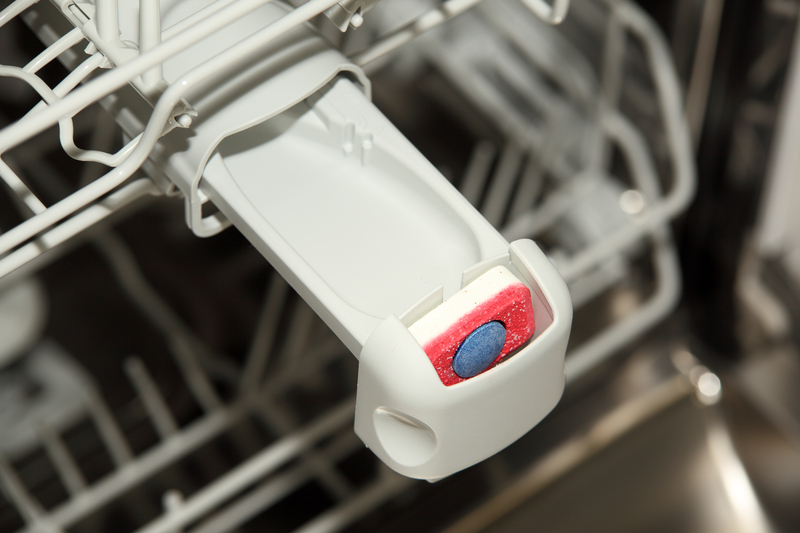Clear Air, Clear Mind: Enhancing Indoor Experiences
Posted on 15/09/2025
Clear Air, Clear Mind: Enhancing Indoor Experiences
Imagine stepping into a room where the air feels fresh, your senses are alive, and your mind is crystal clear. That sensation is possible when you prioritize indoor air quality. In our modern lives, much of our time is spent inside, making the quality of the air we breathe a crucial factor in our well-being and productivity.
In this comprehensive guide, we'll explore how maintaining clear air indoors transforms mental clarity, supports health, and nurtures enhanced indoor experiences. Whether at home, in schools, or in the workplace, optimizing your indoor environment is more essential than ever in today's world.
Why Indoor Air Quality Matters
Most people are surprised to learn that the air inside their homes or offices can be up to five times more polluted than the air outdoors. Given that the average person spends nearly 90% of their time indoors, the quality of indoor air plays a significant role in physical and mental health.
Common Indoor Air Pollutants
- Dust Mites & Allergens: Thrive in upholstered furniture, carpets, and bedding.
- Volatile Organic Compounds (VOCs): Emitted from paints, cleaning products, and building materials.
- Mold & Mildew: Flourish in damp, poorly ventilated areas.
- Pet Dander: Tiny, airborne particles from pets that can trigger allergies.
- Carbon Monoxide & Radon: Harmful gases that can seep into living spaces undetected.
Inadequate indoor air quality can result in headaches, fatigue, respiratory issues, and a lack of mental clarity. Over time, poor air quality contributes to chronic illnesses and impairs cognitive performance, proving just how vital it is to maintain clean air for a clear mind.

The Science: How Clean Air Shapes Mental Clarity
It's no coincidence that a breath of fresh air can help you think more clearly. Scientific research increasingly supports the link between air quality and mental performance. Exposure to pollutants and insufficient ventilation impacts the brain in several ways:
- Reduced Oxygen Levels: Stale, poorly ventilated air means less oxygen for your body and brain, leading to sluggishness and foggy thinking.
- Inflammation: Many pollutants trigger inflammatory responses, increasing your risk of depression and anxiety.
- Distraction & Irritability: Physical discomfort from pollutants, such as sneezing and watery eyes, can make focusing difficult.
- Impaired Cognitive Function: Long-term exposure to poor air quality is linked to memory loss, impaired decision-making, and lower test scores in students.
Scientific tip: A 2022 Harvard University study found that improved office air quality (higher ventilation and fewer pollutants) significantly boosted workers' cognitive function and decision-making skills.
Benefits of Fresh Indoor Air
- Improved Concentration & Focus
- Enhanced Mood & Reduced Stress
- Better Sleep Quality
- Fewer Sick Days & Health Symptoms
- Higher Energy Levels
Clear air means a clear mind: By prioritizing fresh, clean air, you empower yourself (and your family or coworkers) to live, work, and learn at your best.
How to Achieve Clear Air Indoors
Transforming your living or working space into a sanctuary of clean air doesn't require expensive renovations. Here are proven tips and strategies for boosting indoor air quality and fostering tranquil, productive indoor environments:
1. Increase Ventilation
- Open windows and doors whenever possible to circulate outdoor air.
- Use exhaust fans in kitchens and bathrooms to expel humid, stale air.
- Install trickle vents or use whole-house ventilation systems for consistent airflow.
2. Control Humidity
- Keep indoor humidity between 30-50% to inhibit mold and dust mite growth.
- Use dehumidifiers in damp spaces and air conditioners during humid months.
3. Eliminate Pollutants at the Source
- Choose paints, cleaners, and furnishings labeled "low-VOC" or "VOC-free".
- Regularly wash bedding, curtains, and pet beds to remove dust and allergens.
- Avoid smoking indoors, and prohibit burning candles or incense excessively.
4. Invest in Air Purifiers
- High-efficiency particulate air (HEPA) filters are effective at removing airborne particles down to 0.3 microns.
- Consider smart air purifiers that monitor and adjust filtration automatically.
5. Add Air-Purifying Plants
- Snake Plant, Spider Plant, Peace Lily, and Areca Palm help remove toxins and oxygenate air.
- Be mindful of pet-friendly options if you have animals.
6. Maintain HVAC Systems
- Replace filters regularly (every 1-3 months, depending on usage and manufacturer recommendation).
- Schedule professional maintenance annually to keep systems running efficiently.
7. Clean Regularly
- Vacuum using HEPA-filtered machines to capture fine dust and allergens.
- Dust surfaces with damp cloths rather than dry ones to prevent spreading particles.
Indoor Experiences: How Clean Air Elevates Daily Life
Clear indoor air is not just about avoiding illness--it's about enhancing every experience you have within four walls. From enjoying family movie night to powering through a deadline or finding your inner peace during meditation, good air quality is the silent partner in your comfort and performance.
At Home
- Restful Sleep: Bedrooms free from dust, pollen, and chemicals ensure you wake up refreshed.
- Cooking & Entertaining: Proper ventilation clears cooking odors and keeps social spaces inviting.
- Allergy Management: Minimize triggers for sensitive individuals, enhancing overall harmony at home.
At Work
- Productivity: Employees in well-ventilated, purified spaces report higher focus and job satisfaction.
- Fewer Sick Days: Cleaner indoor environments reduce the spread of viruses and allergens.
- Comfort: Optimal temperatures and humidity minimize discomfort and distraction.
In Schools
- Learning Outcomes: Children concentrate better and achieve higher grades in classrooms with superior air quality.
- Attendance: Improved air means fewer sick children and more days in the classroom.
These benefits underscore the importance of clean, clear indoor air in every facet of life. Whether you're nurturing a family, running a business, or teaching tomorrow's leaders, this invisible element sets the stage for indoor success.
Innovations in Indoor Air Quality
Advances in technology are making it easier than ever to monitor and maintain great air quality indoors:
- IoT Air Quality Monitors: These devices provide real-time updates on particulate matter, humidity, CO2, and toxic gases.
- Smart Thermostats: Integrate with ventilation and filtration systems to automatically balance comfort and clean air.
- Ultraviolet (UV) Air Cleaners: Use UV light to neutralize bacteria and viruses as air passes through HVAC systems.
- Plant Walls & Living Green Walls: Architecturally integrated greenery that actively purifies large spaces while boosting morale and aesthetics.
Tips for a Sustainable Indoor Air Solution
While quick fixes can provide immediate relief, a long-term strategy creates a consistently healthier environment. Here are sustainable practices for ongoing clear indoor air:
- Choose eco-friendly cleaning products free from harsh chemicals.
- Invest in high-quality, sealed windows and doors to reduce outdoor pollution while allowing for controlled ventilation.
- Adopt minimalism--fewer items reduces dust accumulation and clutter.
- Encourage a shoes-off policy indoors. Shoes bring in dirt and outdoor toxins.
- Educate family, staff, and students on the importance of air quality and their role in maintaining it.
Routine Check List for Clear Air Maintenance
- Monthly: Check filters, clean vents, and inspect for signs of moisture or mold.
- Quarterly: Deep clean upholstery, wash curtains, and assess air quality using monitors.
- Annually: Schedule professional HVAC servicing and review your space for efficiency upgrades.

The Link Between Clear Air and Wellness
The quest for a clear mind often begins with the body--and nothing supports vitality more quietly yet effectively than fresh air. Ensuring quality indoor air goes beyond comfort; it's a key pillar in overall wellness.
- Allergy and Asthma Relief: Clean air significantly reduces triggers for chronic respiratory conditions.
- Mental Health: Studies link purified environments to reduced anxiety and improved mood.
- Immune System Support: Lower pollutant exposure means the body can focus its defenses where they matter most.
- Enhanced Social Experience: Welcoming, clean-smelling spaces put guests and residents at ease.
Conclusion: The Clear Air, Clear Mind Connection
Now that you understand the science, strategies, and benefits of clear indoor air, the path to a clearer mind and better indoor experiences is in your hands. It starts with simple, conscious choices--ventilating your home, choosing safe cleaning supplies, investing in air purifiers, and nurturing green spaces inside.
A clear mind is shaped by the air we breathe. Prioritize a healthier, happier, and more productive life by optimizing your air quality today. Your body, mind, and everyone you share spaces with will thank you.
Frequently Asked Questions: Clear Air, Clear Mind
- How often should I change my air filters? Most experts recommend every 1-3 months, but check the manufacturer's guidance for your system and adjust if you have allergies or pets.
- Are air-purifying plants enough? Plants can help, but they should complement--not replace--ventilation, filtration, and regular cleaning.
- What's the most important first step? Increase ventilation and eliminate obvious sources of pollutants. These simple steps provide the most immediate benefits.
Ready for a clearer mind and better indoor experience? Start making changes today for a future of health, clarity, and comfort.




